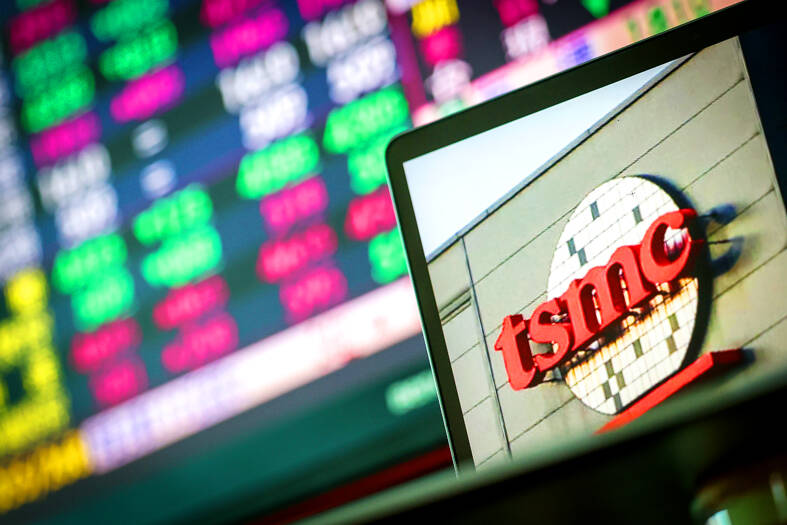The entry of chip giant Taiwan Semiconductor Manufacturing Co (TSMC, 台積電) into the elite club of the world’s most valuable companies is further proof that the generative artificial intelligence (AI) revolution is shaking up Wall Street.
TSMC, which is listed in Taipei and New York, on Monday briefly broke the US$1-trillion market capitalization barrier, putting it ahead of Tesla Inc as the seventh-most valuable technology giant on the stock market.
Also on Monday, Alphabet Inc, Apple Inc and Meta Platforms Inc hit all-time highs.

Photo: CNA
The top 10 of the world’s most valuable companies is headed by Microsoft Corp and Apple, closely followed by AI chip designer Nvidia Corp.
Their global stock market valuations exceed US$3 trillion on Wall Street.
Alphabet and Amazon.com Inc, which recently topped the US$2-trillion mark, follow in an ever-changing ranking.
Oil giant Saudi Aramco slipped into sixth place, followed by Meta, TSMC and Tesla.
“The semiconductor industry is now the leading sector in the S&P 500,” CFRA Research analyst Angelo Zino said recently. “It’s taken over the last 15 or 18 months. That shows you how much the world has changed.”
The explosion in worldwide demand for chips, boosted by the rise of computing-intensive generative AI, promises sustained expansion for the industry.
Chipmakers are not only attracting investors, but also a host of government subsidies.
US President Joe Biden’s administration, for example, has granted tens of billions of dollars in financial support over several years to help build chip factories in the US.
Worldwide sales of semiconductors, which include integrated circuits, microprocessors and memory chips, are expected to reach US$611.2 billion this year, a record for the industry, the Semiconductor Industry Association said.
Sales are expected to jump by 16 percent this year and 12.5 percent next year, the association said.
Nvidia, a designer of graphics processing units (GPUs), is the frontrunner of the craze, and has triumphed on Wall Street in recent months.
Nvidia’s GPUs are a crucial component in building generative AI and since the November 2022 launch of ChatGPT, its market capitalization has increased eightfold.
In the middle of last month, the Santa Clara, California-based group even briefly became the world’s most valuable publicly traded company, ahead of Microsoft at US$3.3 trillion.
“Nvidia’s GPU chips are the new gold or oil of the technology sector,” Wedbush Securities Inc analysts said.
For them, Nvidia, Apple and Microsoft are now engaged in “the race for the 4 trillion dollar market valuation.”
TSMC, with most of its factories based in Taiwan, is well-placed to also reap the rewards.
While Nvidia, which only designs chips, but does not manufacture them, remains discreet about its supply chain, it is widely believed that the bulk of its products are manufactured by TSMC.
The Taiwanese giant, which controls more than half of the world’s semiconductor demand, posted first-quarter sales of US$18.87 billion, up 13 percent year-on-year, while net income climbed 9 percent to US$6.97 billion.
As for Nvidia, its quarterly profit reached US$14.9 billion, a sevenfold increase over the previous year, on sales of US$26 billion.

The US dollar was trading at NT$29.7 at 10am today on the Taipei Foreign Exchange, as the New Taiwan dollar gained NT$1.364 from the previous close last week. The NT dollar continued to rise today, after surging 3.07 percent on Friday. After opening at NT$30.91, the NT dollar gained more than NT$1 in just 15 minutes, briefly passing the NT$30 mark. Before the US Department of the Treasury's semi-annual currency report came out, expectations that the NT dollar would keep rising were already building. The NT dollar on Friday closed at NT$31.064, up by NT$0.953 — a 3.07 percent single-day gain. Today,

‘SHORT TERM’: The local currency would likely remain strong in the near term, driven by anticipated US trade pressure, capital inflows and expectations of a US Fed rate cut The US dollar is expected to fall below NT$30 in the near term, as traders anticipate increased pressure from Washington for Taiwan to allow the New Taiwan dollar to appreciate, Cathay United Bank (國泰世華銀行) chief economist Lin Chi-chao (林啟超) said. Following a sharp drop in the greenback against the NT dollar on Friday, Lin told the Central News Agency that the local currency is likely to remain strong in the short term, driven in part by market psychology surrounding anticipated US policy pressure. On Friday, the US dollar fell NT$0.953, or 3.07 percent, closing at NT$31.064 — its lowest level since Jan.

Hong Kong authorities ramped up sales of the local dollar as the greenback’s slide threatened the foreign-exchange peg. The Hong Kong Monetary Authority (HKMA) sold a record HK$60.5 billion (US$7.8 billion) of the city’s currency, according to an alert sent on its Bloomberg page yesterday in Asia, after it tested the upper end of its trading band. That added to the HK$56.1 billion of sales versus the greenback since Friday. The rapid intervention signals efforts from the city’s authorities to limit the local currency’s moves within its HK$7.75 to HK$7.85 per US dollar trading band. Heavy sales of the local dollar by

The Financial Supervisory Commission (FSC) yesterday met with some of the nation’s largest insurance companies as a skyrocketing New Taiwan dollar piles pressure on their hundreds of billions of dollars in US bond investments. The commission has asked some life insurance firms, among the biggest Asian holders of US debt, to discuss how the rapidly strengthening NT dollar has impacted their operations, people familiar with the matter said. The meeting took place as the NT dollar jumped as much as 5 percent yesterday, its biggest intraday gain in more than three decades. The local currency surged as exporters rushed to